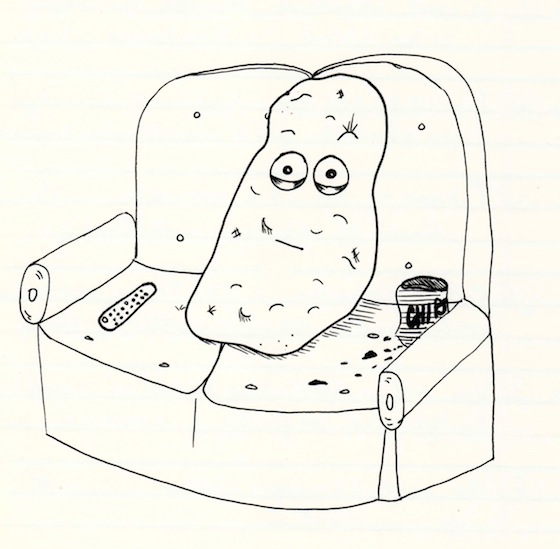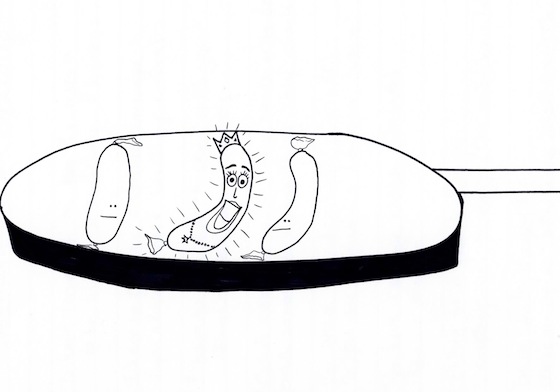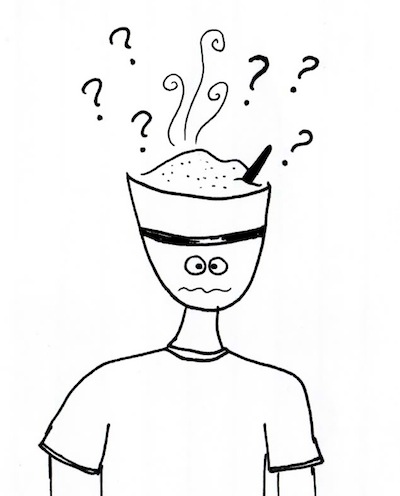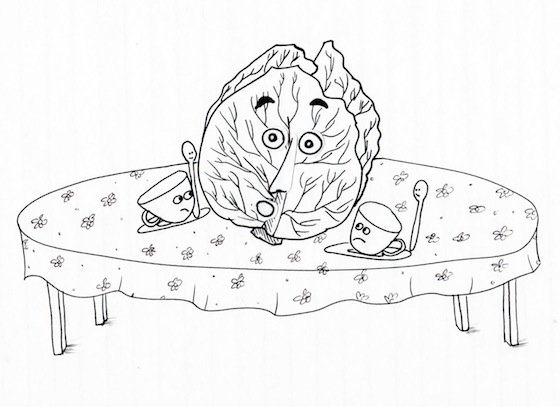As a food writer, interpreter and collector -- this is totally my cup of tea!

Sofa spud or American "Couch potato"
English has plenty of food-isms too. We refer to others as: the big cheese, a couch potato, or an apple polisher. Or hotly declare, “You’re toast!”
We can also butter someone up with praise such as: "you’re the apple of my eye," "you’re a peach" or use terms of endearment like honey, sweetie-pie, and sugar.
Just as I became consumed by searching for edible expressions, our summer houseguests from Germany and Argentina arrived. So I peppered them with questions about food phrases in their native languages.

"Have to fry you a special sausage" - German
GERMAN (thanks to Orna Gutmacher)
Extrawurst braten = I have to fry you a special sausage = you always need something extra
Kleine Bröchten backen = bake little rolls = take small steps to start something
Schokoladenseite zeigen = to show your chocolate side = to only see good things
Tomaten auf den Augen haben = to have tomatoes on the eyes = to be blind to something
Ich habe mit dir ein Hühnchen zu rupfen = I have to pluck a chicken with you = we need to talk
Das Haar in der Suppe finden = to look for the hair in the soup = never be satisfied
SPANISH (thanks to Susana Pendzik)
Me importa un pepino = I care a cucumber = I don’t give a fig
Agarrar a alguien con las manos en la masa = to catch someone with their hands in the dough = to catch someone doing something they shouldn’t
Pedirle peras al olmo = to ask for pears from an elm tree = try to do something that’s impossible
Next, I asked two local friends, who enlisted help from their Facebook friends back in Denmark and Turkey and collectively came up with dozens of phrases.

"Porridge Head!" - Danish
DANISH (thanks to Kim Aronson)
Nye boller på suppen = we need new (meat)balls in the soup = we need new energy, input, ideas
Pølsearme = sausage arms = you are weak
Grødhovede = porridge head = you are confused, have no brain
En tynd kop te = it’s a weak cup of tea = your case is not very strong
TURKISH (thanks to Suzi Amado)
Incir cekirdegini doldurmayacak sebepler = Reasons that would not fill a fig seed = There aren’t good enough reasons to be upset.
Agzinda bakla islanmamak = A fava bean doesn’t get wet in somebody’s mouth = If you tell this person a secret, they will tell it to others
Her seye maydanoz olmak = Being parsley to everything = Having an opinion and being nosy about everything
Sutten agzi yanan yogurdu ufleyerek yer = If your mouth is burnt by milk, you blow before you eat yogurt = If something bad happens to you, you get anxious about things that are somewhat related, although it doesn't make sense. This phrase is often used for dating or friendships when someone gets hurt and then becomes very self-protective.
Benim basima gelen cig tavugun basina gelmez = What happened to me would not happen to a raw chicken. This could be used when what happened to me is so weird that it is funny.
Thrilled at the response and variety of food images in different languages, I approached some of the people I’ve written about previously. (It’s helpful that my favorite subject is the intersection of food and culture).
Tomoko Yoshihara, who was such a generous guide on my recent trip to Kyoto, shared these pithy sayings from JAPANESE:
Sansho ha kotsubu de piririto karai, Sansho [a Japanese pepper] is small, but hot enough = Even though a person is very small, if they are cheerful and have talent, you can't ignore them.
Mochi ha mochi ya, Rice cake, rice cake maker = Each field has an expert.
Lali Ghlonti, (whose Georgian and Russian dishes at the SF Street Food Festival, I recently described) contributed this RUSSIAN saying:
to hang noodles on someone’s ears = to tell them a lie.
Simone Fung, one half of S+S Gastro Grub, the masters of molecular gastronomy I profiled in April, suggested a few CANTONESE phrases:
Chicken feather, garlic skin = irrelevant or worthless things
A jealous person is said be sipping vinegar
Are you made out of tofu? – typically asked of kids who cry all the time
Last March, I interviewed Monier Attar about her Persian New Year celebration. She recently offered this good advice from FARSI:
Whoever eats melon should be ready for shivering = if you do something, you have to be ready to deal with the consequences.
Mostafa Raiss El Fenni, who taught me how to eat with my hands, shared this wise counsel from MOROCCAN ARABIC,
Eda kan hbibak aassel, mat'lehsushi kamel = If your dear friend is honey, don't lick him all up = "if your friend is very generous, don't just keep taking from him or her"
And this bit of ironic wit: Rabi aata l'hammus li ma aandu snan God gives fava beans to people with false teeth. He explains, "You need real teeth to chew fava beans. Sometimes people get things they don't need; while others who can really use it, don't get it. It's like a billionaire winning the lottery."
Then, I turned to my fellow Bay Area Food Bloggers.
Renate contributed this description from GERMAN: Er hat nicht alle Tassen im Schrank = He doesn't have all of his coffee/tea cups in his cabinet = "he’s a few cards shy of a full deck"
Orly wrote, “In Israel we use a phrase in a mix of HEBREW and ARABIC: Yom Asal Yom Basal = which literally means a day of honey, a day of onions and translates to "a good day, a bad day".
Another friend, Yardena, shared this from HEBREW: Shikor velo meyayin: Drunk, but not from wine, (meaning, in love).
And Judy Kunofsky from Klez California kindly answered my last minute request with this gem from YIDDISH:
Vi a kalteh kugl af purim – like a cold kugel on Purim ("meaning: when pigs fly or never, because Purim is a Jewish holiday on which you can cook, so no one would ever serve a cold kugel [noodle pudding]").
Other food bloggers referred me to more than 50 FRENCH sayings complied by Clotilde Dusoulier on her popular blog Chocolate and Zucchini. One example she cites is "Long comme un jour sans pain.", "as long as a day without bread," to express that something is very long, especially the duration of an event."
I was also directed to a terrific collection of ITALIAN food phrases collected by local Vanessa DellaPasqua in her blog, Italy in SF – Intriguingly, I noticed her list includes many phrases about bread:
E’ buono come un pezzo di pane = He’s as good as a piece of bread. = He’s a good person, a really nice guy.
Rendere pan per focaccia =
To give back bread for focaccia
= Similar to “an eye for an eye,” it is used metaphorically to illustrate a payback for a suffered wrong.
L’ho comprato per un tozzo di pane
= I bought it for a piece of bread.
= It was a real deal, very underpriced compared to its value.
Plus one of my favorites:
C’entra come i cavoli a merenda
= It fits like cabbage for the afternoon snack
= It doesn’t fit, it’s inappropriate

"Like cabbage for the afternoon snack" - Italian
Not surprisingly, several of the CHINESE food sayings, also compiled by Joe Lurie, refer to rice.
In business, “being handed a rice bowl” is to be hired, while “having your rice bowl broken,” is to be fired.
I love this Chinese bit of wisdom: “if you pick up a sesame seed, you may drop a watermelon,” meaning, if you focus on trivial matters, you may lose sight of important issues.
Then just last week, I met two young Iraqi men who are interning in a local high-tech company for a few months. Wael and Ibraheem were glad to contribute these sayings in IRAQI ARABIC:
He or she is like a tomato = a compliment for being socially flexible and able to get along in any situation ("because we put tomatoes on everything")
You’re making a kubba [a fist-sized fried dumpling made of meat covered in rice] out of a bean = you exaggerate too much, or you're making a mountain out of a molehill.
ASL, American Sign Language, can also take its place at the food idiom table with
BRING BREAD BUTTER = earn the money for the family or “bring home the bacon” and
FISH SWALLOW = gullible, as in "Gotcha! You fell for it!" which points up ASL's historical link to French Sign Language (LSF). In France, April 1 is called "Poisson d'avril" (April fish) and those who are fooled by a prank have "swallowed the fish".
(Thank you Dan Langholtz, Priscilla Moyers and Nikki Horrell)
The deliciously descriptive food phrases above, representing 17 languages, just whet my appetite. I'm sure there are many more juicy ones from around the world. So, here's open invitation: Please share your own favorite food phrases and send this on to anyone who might know some from a language not yet listed. Let’s invite everyone to the feast!




